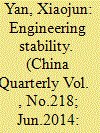| Srl | Item |
| 1 |
ID:
145884


|
|
|
|
|
| Summary/Abstract |
Ideological campaigns in post-Deng China have a strategic function of discerning loyalties of local leaders. Previous empirical studies have found that Jiang Zemin’s followers are more likely to echo Jiang’s ideological campaigns. Through a content analysis of provincial newspapers between 2005 and 2012, this study suggests that the manner of displaying loyalties has completely changed. By employing a panel-corrected standard errors (PCSE) estimation, this study finds that protégés of both Hu Jintao and Jiang Zemin are less likely to echo their patron’s ideological campaigns, suggesting the shifting function of ideological campaigns from monitoring identified followers’ loyalties to recruiting new followers. This article argues that this is a result of changing elite politics and—more importantly—the different strategic use of ideological campaigns.
|
|
|
|
|
|
|
|
|
|
|
|
|
|
|
|
| 2 |
ID:
132957


|
|
|
|
|
| Publication |
2014.
|
| Summary/Abstract |
Given their critical influence on society and politics, university students are one of the key target groups for authoritarian political control around the world. To further our understanding of the endurance and resilience of authoritarianism in post-Deng China, it is necessary to examine one of the Party-state's most crucial control frameworks: the institutional mechanism through which it preserves social stability in the nation's 2,358 university campuses, and maintains control over its more than 22 million college students. Drawing upon intensive field research conducted in 2011, this article attempts to map out the structures and measures deployed by the post-Deng regime to nurture political compliance and consolidate its domination of university campuses. By deciphering an essential component of the state's political control apparatus, this article aims to shed new light on the internal operations of the authoritarian system that is running China today.
|
|
|
|
|
|
|
|
|
|
|
|
|
|
|
|
| 3 |
ID:
123700


|
|
|
|
|
| Publication |
2013.
|
| Summary/Abstract |
The past two decades have witnessed increasing use of the concept of 'bureaucratic capitalism' to explain various endemic problems in China, including corruption and social inequalities. Yet, scant attention has been paid to the rise of key bureaucratic capitalists and the state corporations under their control. Neither has there been adequate discussion of the recent form of bureaucratic capitalism in contradistinction to that of the previous forms evolving in the republican and early reform periods. In question therefore is a small circle of bureaucratic bourgeoisie who are children, close relatives or protégés of top political leaders. They have come to control key state-corporation apparatuses, and some of whom possess close ties with the military. In conclusion, the future implications of this emergent form of bureaucratic capitalism on Chinese politics will also be discussed.
|
|
|
|
|
|
|
|
|
|
|
|
|
|
|
|